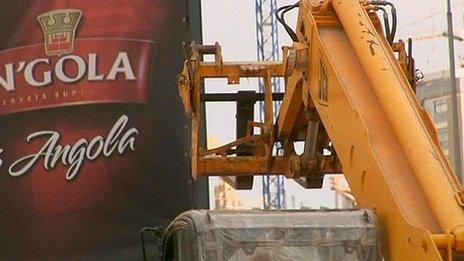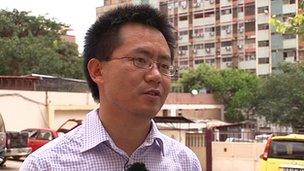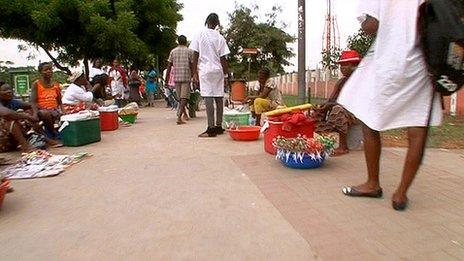Angola's businesses beat most of Europe to 4G mobile services
- Published
Growth spurt: Luanda has changed
It is 10 years since the end of Angola's civil war.
The country has made enormous strides in rebuilding its economy, which is expected to grow by around 8% this year.
Much of that is due to the country's enormous oil reserves - it's now the second biggest producer in Africa.
The rapid growth in the economy has led to a boom in infrastructure development.
That's evident in the capital Luanda, where you'll see the skyline being transformed by newly-built towers of glass and steel.
Look out to the coast from downtown and you'll be greeted by the spectacle of a vast sweep of land being reclaimed from the sea, to build a dramatic new peninsula.
Expect a new marina, yet more skyscrapers and fancy restaurants to populate the area, in the years to come.
Going mobile
But infrastructure growth doesn't just mean more office blocks and motorways.
It also means a big upgrade in the mobile phone network available to Angolans. They're in the process of getting high-speed 4G services - ahead of most of Europe and many parts of the US - thanks to a $100m project underway there.
It means customers in Luanda will enjoy faster mobile download speeds than their counterparts in London.
The phone operator is Movicel - the one of Africa's biggest GSM providers.

As the economy expands in Angola, so does the construction industry
Antonio Francisco is chief operations officer and insists that his country must have the best technology available in order to boost economic development.
"The telecoms sector is a strategic sector," he tells me in the company's swish new offices away from the bustle of downtown Luanda.
"We can't think about the growth of the economy unless we have telecoms infrastructure well done. What we're doing is bringing the newest technology that can provide better mobile broadband."
Chinese connection
Movicel has partnered with Chinese phone giant ZTE to bring in 4G.
The firm is providing all the equipment - including handsets. It will also play a crucial role in the $1bn upgrade of Movicel's entire system.
But ZTE doesn't do any manufacturing in Angola - it brings in all its equipment direct from China.

ZTE Angola's Frank Mei says most qualified engineers still come from outside Angola
"We cannot manufacture even the phones or the equipment here", explains ZTE Angola general director Frank Mei.
"Honestly speaking, the education level in this country is still a bit low. I think its because of the war.
"During the war, all the educational resources quit the country. So they've only started to build the educational system now. In our industry, most of the qualified engineers come from abroad."
The initial 4G roll-out includes the oil-producing region of Cabinda, as well as 15 densely-populated cities and towns including Luanda.
The next phase will take in another 30 cities. The operator is expecting to have a million 4G customers by the end of the year. It's part of a wider strategy to boost its overall subscriber base from 4.5m to 7m.
Movicel is also expected to place an order for 4G tablet computers.
Poverty trap
There's no doubt that economic growth has boosted prosperity in some quarters.
For instance, the local Porsche dealership is doing a roaring trade - and complains of struggling to keep up with demand.
But its important to remember that this is still a poor country - where almost 70% of people are thought to live below the poverty line.
So against that backdrop - can 4G really be a success here?

Despite the swiftly-growing economy around 72% of Angolans live on less than $2 a day
"We are playing a game of the future," according to Movicel chief executive officer (CEO) Yon Junior.
"We are building an elegant network to speed up the growth of this country.
"But it's not just a question of technology. It has to be affordable according to the country's needs and capacity to pay."
He also insists the company wants to empower local people.
"More than 95% of my technical team comes from Angola," he tells me. "And we have great support from the Chinese company [ZTE] in transferring knowledge and experience."
As Angola builds for the future, it seems clear that telecoms and technology will play a central role in revolutionising the country's fortunes.
The fact that 4G is coming here ahead of so much of the world shows not just the power of a rapidly expanding market - but the power of a super-charged economy.